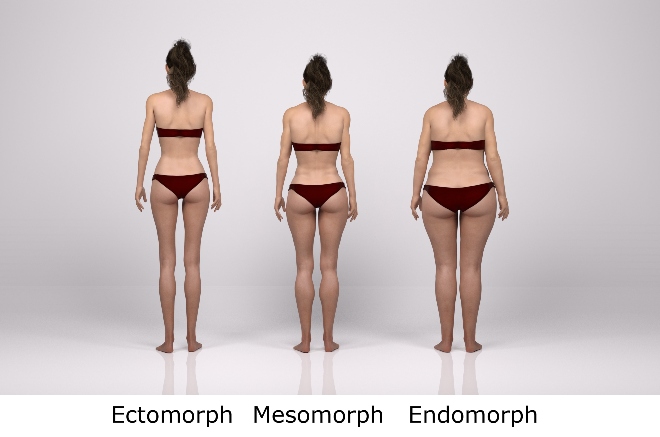How Your Metabolic ID Body Type Affects Weight Loss
We all have that one friend that can eat anything they want and never gain weight.
They can chow down on pastries, have multiple margaritas, get seconds (or even thirds!) at the buffet, and then still look amazing in their bikini come swimsuit season.
And then there are people like me (and maybe you, too), who eat one potato chip and have to spend a week at the gym working it off.
So what is it that lets some people win the all-you-can-eat lottery, and makes others have to fight to lose an inch?
If you guessed genetics, you’re on the right track.
It turns out that your body type—also known as your metabolic ID—plays a huge role in how your body processes food, and how and where it stores fat.
And while you can’t change the metabolic ID you have, you can learn to make the most of what you’ve got.
So we found the best weight loss tips for each of the three main metabolic ID types, so you can finally tap into your own natural leanness (and learn what it is that helps other people win the all-you-can-eat lottery!).
But first, let’s talk about what your metabolic ID type is, and why it matters.
This post may contain affiliate links, which helps keep this content free. Please read our disclosure for more info.
What is a Metabolic ID?
Metabolic ID type was first studied in the 1940s as a way of classifying body size and shape.
It has since evolved into a more precise measurement system to help figure out health factors related to your body’s composition.
Officially, metabolic ID is determined using several measurements of different areas of the body; but most people can figure out their type by doing a simple self-assessment based on the common traits of each body type.
The most important information you will get from learning your metabolic ID is how your body processes food. (1)
This is incredibly important because it will help you to:
- Choose the foods that your body best responds to
- Avoid the foods that your body poorly responds to
- Look out for other potential health pitfalls
- Maximize your dieting and weight loss efforts.
Consider it a nutrition label of sorts for your body.
This is especially helpful if you’ve been trying to lose weight for a while, and nothing is working.
You might just be eating the wrong foods for your metabolic type—and changing a few simple things can make all the difference!
The 3 Most Common Metabolic ID and Body Types

While there are several metabolic ID types, here are the three most common:
- Ectomorph
- Mesomorph
- Endomorph
You might have characteristics of more than one of these body types, so don’t worry if your body doesn’t match one of these one hundred percent.
Follow these weight loss tips for the metabolic ID that is closest to yours, and you will see results!
Ectomorph

Someone with this metabolic ID will usually be slender and can even become too skinny if they exercise too much, or don’t eat enough.
This is that friend of yours that can devour an entire pizza without gaining an ounce. (Must be nice!)
However, people with this metabolic ID need to be careful to stay healthy without weight as an indicator, or they could end up with serious health consequences.
Health and Weight Challenges of the Ectomorph:
- Ectomorphs won’t often become overweight, but you can still gain too much fat, especially visceral fat.
- This type can also struggle with internal health (cholesterol, hormone imbalance, bloating, low energy) due to poor diet, especially since they don’t have weight as a health indicator or motivator.
- If ectomorphs continue with a poor diet for too long, hormone imbalance will eventually send you from “skinny fat” to a more endomorphic metabolism–meaning you will easily gain weight, and have trouble getting rid of it.
Ectomorph characteristics:
- Long and lean body
- Little body fat, but also very little muscle
- Have difficulty gaining weight
- Typically have a small or flat chest
- Much faster metabolism
How to Work With your Ectomorph Metabolism:
- Though you have a fast metabolism and can burn off calories quickly, you should still maintain a healthy diet for overall health
- Don’t skip breakfast, and instead eat frequent, small meals throughout the day instead of a few large ones
- Supplement your diet with extra protein to help with energy and muscle building
- Focus on strength training
- Keep cardio to a minimum so you don’t lose too much weight (2).
Mesomorph

Mesomorphs tend to be athletic and strong, and can gain and lose weight relatively easily.
This body type does really well in fitness competitions, and can easily get that toned, sculpted look we all would love to have.
But, people with this metabolic ID type can also pack on the pounds quickly, and need the right motivation and plan to take the weight back off. (Freshman fifteen or quaran-ten, anyone?)
Health and Weight Challenges of the Mesomorph:
- Since both weight gain and weight loss come easily, this type often struggles with yo-yo dieting
- Motivation and complacency can be big roadblocks for mesomorphs, especially if they have lost weight easily in the past
Mesomorph Characteristics:
- Athletic build
- Typically have broad shoulders
- Easily gains muscle, and has a strong body
- Their body responds well to exercise
- Any fat they do carry tends to be in the lower body
How to Work With your Mesomorph Metabolism:
- Aim for 40% complex carbs, 30% lean protein, and 30% healthy fats (3).
- When trying to lose weight, cutting back on carbs is most important.
- Do intense workouts with an equal mix of cardio and strength training to burn the most calories and build fat-torching muscle faster.
Endomorph

If all you have to do is think about dessert to instantly gain five pounds, you might be an endomorph.
Endomorphs struggle to lose weight, and it’s incredibly easy for them to gain weight—which means slimming down takes way more effort for you than for the other metabolic ID types. (2)
However, with the right diet and exercise, you can turn your rolls on rolls into hourglass curves that other body types struggle to attain.
Need help? Read more about our 21-Day Fat Loss Challenge at the end of this article.
Health and Weight Challenges of the Endomorph:
- Your body holds onto fat like Great Depression-era grandmas store literally everything—as if it could be months before you will eat again, and disaster and starvation could come at any moment.
- This also means endomorphs tend to have low energy and tire quickly since your body doesn’t convert energy readily.
- Your hormone levels are most at risk of all the types because you hold on to the most fat; so cutting carbs and sugars is absolutely key to finally losing weight.
Endomorph Characteristics:
- Round body
- Easily gains weight, but also gains muscle with ease
- Has a hard time losing weight
- Much slower metabolism
- Excess weight tends to be carried in the midsection
- Usually has strong leg muscles, but weak upper body muscles
How to Work With your Endomorph Metabolism:
- Increase your fiber with meals so that you feel full longer.
- Avoid simple carbs, and limit your complex carb intake.
- High-intensity cardio workouts will take your weight loss to the next level—the sweatier you are at the end of your workout, the better.
- Ditch the crunches and focus on total body exercises for best results (4).
The Hidden Weight Gain Factor
If you feel like you might be a mesomorph or ectomorph, but you hold on to weight like an endomorph, you might be insulin resistant. (And insulin resistance is also common for endomorphs, too!)
The most common reason people develop insulin resistance is from eating too many simple carbs and sugars, and being insulin resistant means that your body can’t process any carbs properly anymore—even the healthy ones.
So that makes it nearly impossible to lose weight, even if you’re eating a low-calorie diet and doing everything you’re “supposed” to do.
If you think you might be insulin resistant, try going on a full carb detox and see how your body reacts.
If you finally drop a lot of weight quickly, you have your answer! Over time, you will notice health improvements like better energy, improved sleep, hair regrowth, and etc. as your hormone levels balance out.
Pro tip: You can make your carb detox for weight loss even more effective by combining it with intermittent fasting, which is a big part of why our clients lose as much as 7-10 pounds in their first WEEK with our 21-Day Fat Loss Challenge.
How to Get Healthy with Any Metabolic ID
Even if you don’t have a lot of weight to lose, it’s important to take care of your internal health.
If you’re storing excess fat in your body, or if you have high blood pressure, hormonal imbalances, or other health concerns, you need to change your diet.
We created our 21-Day Fat Loss Challenge not only to help people just like you lose tons of weight quickly but also to help them improve their overall health by rebalancing their hormones and digestive system.

Our challenge provides a step-by-step plan to help you lose up to 21 lbs in just 21 days, with far less effort than you may think!
If you have more than 21 pounds to lose, our challenge was designed to be repeated as many times as you want in order to reach your goal weight.
Plus, our methods get your body, mindset and digestive system in balance so you actually keep the weight off!
The best part?
You don’t even have to exercise to lose weight with the 21-Day Fat Loss Challenge.
Tons of our clients have turned it into a lifestyle diet and have lost as much as over 100 pounds with the diet!
But even better than the weight loss is the feedback we get from people about how the program has taught them how to change their eating habits and find a diet that truly works for them in the long-term.
We have over 4,000 people in our private support group going through the Challenge together, and they share experiences, results, motivation, and lots of recipes!
If you are ready to make some changes in your life, this is the ONLY place you should start. We will teach you exactly how to make the necessary changes in your diet and your lifestyle and how to keep them “beyond the diet.”
Click HERE to start YOUR 21-Day Fat Loss Challenge today!
Leave a comment below if you enjoyed this article on metabolic ID and weight loss, or if you have any questions!

